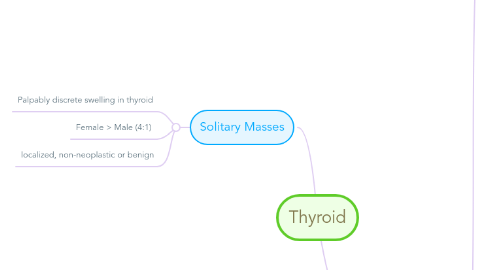
1. Solitary Masses
1.1. Palpably discrete swelling in thyroid
1.2. Female > Male (4:1)
1.3. localized, non-neoplastic or benign
2. Neoplasms
2.1. Bengin
2.1.1. well-encapsulated
2.1.2. expansile growth pattern
2.1.3. Types
2.1.3.1. Follicular adenomas
2.1.3.1.1. discrete, solitary mass
2.2. Malignant
2.2.1. Uncommon but good prognosis
2.2.2. Types
2.2.2.1. Papillary (85%)
2.2.2.1.1. Rearrangements of the tyrosine kinase receptors RET or NTRK1 or activating point mutations in BRAF.
2.2.2.1.2. > Women (25-50)
2.2.2.1.3. un-encapsulated, infiltrative and may be multifocal
2.2.2.1.4. Risk factor: exposure to ionizing radiation
2.2.2.1.5. Features: 1. Papillary structures 2. Psammoma bodies 3. Grooved nuclei 4. Orphan Annie nuclei 5. Pseudoinclusions
2.2.2.2. Follicular (15%)
2.2.2.2.1. Mutations in RAS (oncogenes)
2.2.2.2.2. > Women (40-60)
2.2.2.2.3. More frequent in areas with dietary iodine deficiency
2.2.2.2.4. Metastasis: most commonly in the lung or bones.
2.2.2.2.5. Features: 1. Solitary encapsulated 2. closely packed small follicles 3. Degenerative changes (central fibrosis and foci of calcification) sometimes present.
2.2.2.3. Medullary (5%)
2.2.2.3.1. Familial medullary thyroid carcinomas occur in multiple endocrine neoplasia type 2 (MEN-2) RET (protooncogene mutation)
2.2.2.3.2. Derived from the C-cells, neuroendocrine tumor, secretes calcitonin
2.2.2.3.3. Features: 1. sporadic neoplasms originate in one lobe, bilaterality and multicentricity are common in familial cases. 2. necrosis and haemorrhage, firm, pale gray to tan, and infiltrative.
2.2.2.4. Anaplastic (<5%)
2.2.2.4.1. Inactivating point mutations in the p53 (tumor suppressor) gene
2.2.2.4.2. rapid growth rate, Lethal (100%)
2.2.2.4.3. older age group > 65 year
2.2.2.4.4. Undifferentiated tumors Can be arising from papillary carcinoma
2.2.2.4.5. Features: Highly anapaestic cells, Large, pleomorphicgiant cells, occasional osteoclast-like multinucleate giant cells, Spindle cells with a sarcomatous appearance, Mixed spindle and giant cells.
